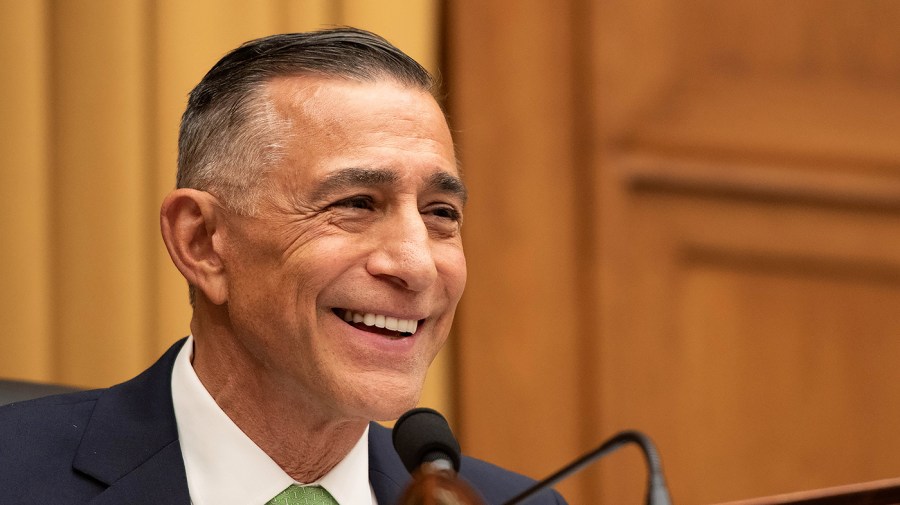
The House on Wednesday passed a bill restricting district court judges from issuing nationwide injunctions in a move that would vastly diminish the ability of courts to block President Trump’s policies.
Dubbed the No Rogue Rulings Act, the legislation from Rep. Darrell Issa (R-Calif.) would limit judges to providing relief only to parties directly involved in the suit.
The bill passed in an 219-213 vote.
It would bar district court judges from issuing nationwide injunctions, even when the matter has an impact across the country — undercutting numerous lawsuits challenging Trump’s directives.
“Since President Trump has returned to office, left-leaning activists have cooperated with ideological judges who they have sought out to take their cases and weaponize nationwide injunctions to stall dozens of lawful executive actions and initiatives,” Issa said.
“These sweeping injunctions represent judicial activism at the worst.”
To Democrats, however, a recent string of Trump losses in court reflects not rogue judges but rather the lawlessness of his actions.
“My colleagues on the other side of the aisle want you to believe that somehow these nationwide injunctions being issued by courts across the country against Donald Trump’s illegal and unconstitutional actions are unfair,” Rep. Pramila Jayapal (D-Wash.) said.
“Here’s the message: If you don’t like the injunctions, don’t do illegal, unconstitutional stuff. That simple.”
Both chambers have introduced bills to curb nationwide injunctions, but Republicans picked up the mantle this year after U.S. District Court James Boasberg temporarily barred the Trump administration from deporting Venezuelans to a Salvadoran prison under the Alien Enemies Act.
Trump has called for the judge’s impeachment while other GOP voices have complained about the ability of one judge to hamstring a White House policy from being implemented across the country.
But Democrats argue the injunctions properly protect from harm those across the country even if they are not directly involved in the suit.
Many have cited Trump’s order attempting to block birthright citizenship for those not born to citizen parents. Judges appointed by presidents of both parties struck down the order, finding it violated the constitution’s guarantee of citizenship for all born in the U.S.
Democrats argue it makes no sense that the parents of each child would need to sue individually.
“Nationwide injunctions play an essential role in protecting our democracy and holding the political branches accountable. Without them, millions of people could be harmed by these illegal or unconstitutional government policies,” Jayapal said.
Judges have increasingly issued nationwide injunctions over the last 25 years, a trend accompanied by growing scrutiny of their legitimacy.
Judges issued six nationwide injunctions during President George W. Bush’s administration, according to an analysis published in the Harvard Law Review. The number doubled to 12 during the Obama administration before skyrocketing to 64 during Trump’s first term.
During the Biden administration, the number of nationwide injunctions fell back to 14, a figure that has already been surpassed in a matter of weeks in the second Trump administration.
“Judges are asserting this authority by themselves, and it’s an outrageous abuse of public trust and judicial power and opened the Pandora’s box that threatens the constitutional order,” said Rep. Tom McClintock (R-Calif).
“The congress is elected to make law. The president is elected to enforce it. The judiciary is appointed for the sole purpose of resolving cases and controversies brought to it by individual injured parties.”
But Democrats say that Trump — who has already issued more than 100 executive orders during his second term — has far surpassed his predecessors in seeking to shape policy through executive orders beyond the scope of his powers and crafting illegal policy.
“Federal judges have issued at least 68 court orders that block or pause the administration’s lawlessness to prevent irreparable harm in the country from his unconstitutional actions. The judges deciding here were appointed by five different presidents — both Democratic presidents and Republican presidents,” said Rep. Jamie Raskin (Md.), the top Democrat on the House Judiciary Committee.
Sen. Chuck Grassley (R-Iowa) has introduced a similar bill in the Senate that would also limit judicial rulings to the parties directly involved in the case. It’s unclear, however, when the legislation might advance.

